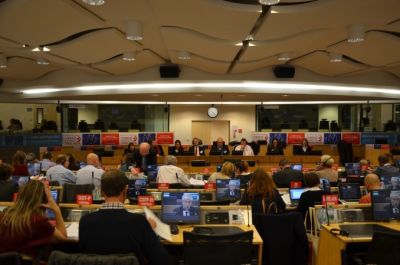
Brussels, 14 June 2016
update : the French version is available
ETUC Position on Commission’s proposal for an Investment Court System in TTIP and CETA
Adopted at the Meeting of 9 June 2016
On 12 November 2015 the European Commission published a new proposal on foreign investor protection in TTIP called the Investment Court System (ICS)[1] aimed at reforming investor-state dispute settlement (ISDS) provisions in previous agreements. The ETUC has consistently denounced the flaws in ISDS. While there was very limited opportunity for discussion or debate in Canada, Europeans did have some possibility to discuss and debate the agreement. Trade unions and civil society in Europe were able to raise serious concerns and win some amendments to ISDS provisions in the agreement. During the final stages of negotiations, the new ICS was incorporated into CETA.
The ETUC acknowledges the fact that the Commission has proposed the ICS to address some of the flaws in ISDS. However, the proposal maintains the parallel legal system which is not necessary in the context of TTIP and CETA, as the US, Canada and the EU all have advanced democratic and independent domestic legal systems.
The ETUC Executive Committee and Congress have clearly rejected the introduction in TTIP and CETA of legal mechanisms extending foreign investors’ access to arbitration not available to domestic investors and other stakeholders. None of the main EU countries engaged in foreign direct investment with the US have agreed Bilateral Investment Treaties, let alone provisions for ISDS. This has not been shown to impede high investment flows, which are much more likely to be affected by other factors such as labour market and taxation conditions. The only EU member states with US BITs are those in Central and Eastern Europe that entered into agreements at turbulent times prior to their joining the EU and their formally becoming subject to EU disciplines, including their adherence to the Copenhagen principles and ECJ jurisdiction.
The ETUC maintains its position and rejects any approach aimed at including special investor protection schemes, including the ICS mechanism in TTIP and CETA, as it maintains a special court for foreign investors that bypasses domestic legal systems. In this regard, point 334 of the ETUC Action Plan adopted at the Paris Congress states: “The ETUC opposes the CETA agreement, which does not fulfil our conditions notably in including ISDS, and we will continue forcefully to oppose any further steps towards its ratification. The ETUC will take the same position in regards to any TTIP agreement. We will continue to monitor progress and press for improvements to promote decent jobs and growth and safeguard labour, consumer, environmental and health and safety standards through lobbying, campaigning and negotiating, in particular in our work in the European Parliament. We call on all affiliates to act at national level in support of this position.”
The formal negotiations on ICS only started during the 12th TTIP negotiating round in February 2016. The US only tabled its initial proposal during that round. It is improbable that the US in particular would be ready to accept the EU’s ICS proposals, and seeking to find a compromise covering the US ISDS template, perhaps as adapted in the TPP, would undermine any advances the EU system could provide.
However, it is important to note that even without ICS, the ETUC continues to have concerns about a significant number of other areas of TTIP and CETA, including the inadequate exemption currently provided for public services and the lack of enforcement provisions for labour standards in the text. The ETUC calls on the European Commission to engage with trade unions to address these concerns.
[1] The Investment Court System will be composed of a Tribunal of first instance and an Appeal Tribunal. There will be a code of conduct, the arbitrators will have technical and legal qualifications comparable to those required for the members of permanent international courts, such as the International Court of Justice and the WTO Appellate Body.
